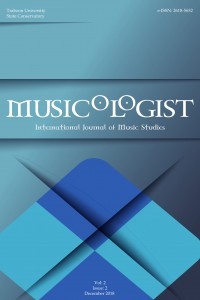Aesthetically Warranted Emotions in the Theme of the Final Movement of Beethoven’s Piano Sonata Op.10 No.3
Aesthetically Warranted Emotions in the Theme of the Final Movement of Beethoven’s Piano Sonata Op.10 No.3
In a video commentary, pianist and conductor Daniel Barenboim (2016) discussed the dangers of verbal descriptions of music by presenting two seemingly contradictory explanations about the ‘meaning’ of the theme of the final movement of Beethoven’s Piano Sonata Op.10/3 given by pianists Edwin Fischer and Claudio Arrau. We examined the tempo and dynamic fluctuations obtained from the studio recordings of this theme by Fischer in 1948 and 1954, and by Arrau in 1964 and 1985 by using the Sonic Visualiser software (Cannam et al., 2010), and interpreted these results by using Steve Larson’s (2012) theory of musical forces, and Robert Hatten’s (2018) theory of virtual agency in western music. According to our analyses, the differences in the performances of Fischer and Arrau can be metaphorically correlated with the different meanings these pianists attributed to Beethoven’s theme. We concluded that the seemingly contradictory verbal descriptions of these pianists indicate different aesthetically warranted emotions they aimed to communicate through their performances of Beethoven’s theme.
___
- Agawu, Victor Kofi. (1991). Playing with Signs: A Semiotic Interpretation of Classical Music. Princeton: Princeton University Press.
- Barenboim, Daniel. (2016, October 28). 5 Minutes On... Beethoven - Piano Sonata No. 7 (D major) | Daniel Barenboim [subtitulado] [Video File]. Retrieved from https://www.youtube.com/watch?v=wh-pcrWG3Mg
- Beethoven, Ludwig van. (1862). Piano Sonata No.7 in D Major, Op.10 No.3 [Musical Score] Leipzig: Breitkopf und Härtel. [Original work published 1798]. Retrieved from Petrucci Music Library.
- Beethoven, Ludwig van. (1987a). Piano Sonata No.7 in D Major, Op.10 No.3 [Recorded by Edwin Fischer]. On Beethoven – Klavierkonzert N°5, Klaviersonate N° 7, Op. 10 N° 3 – Edwin Fischer, Philharmonia Orchestra, Wilhelm Furtwängler [CD]. London: EMI Records Ltd. (1954)
- Beethoven, Ludwig van. (1987b). Piano Sonata No.7 in D Major, Op.10 No.3 [Recorded by Claudio Arrau]. On Beethoven – Piano Sonatas Op.7 6 Op.10/3 – Claudio Arrau [CD]. La Chaux-de-Fonds: Philips Classics Productions. (1985)
- Beethoven, Ludwig van. (1995). Piano Sonata No.7 in D Major, Op.10 No.3 [Recorded by Edwin Fischer]. On Edwin Fischer Plays Beethoven Piano Sonatas [CD]. Hamburg: Music & Arts. (1948)
- Beethoven, Ludwig van. (2012). Piano Sonata No.7 in D Major, Op.10 No.3 [Recorded by Claudio Arrau]. On Beethoven Complete Piano Sonatas – Claudio Arrau [CD]. Amsterdam: Decca Records. (1964)
- Bowen, José Antonio. (2001). “Finding the music in musicology: Performance history and musical works” Rethinking Music, Eds. Nicholas Cook and Mark Everist: pp. 424-451. New York: Oxford University Press.
- Cannam, Chris; Landone, Christian; Sandler Mark. (2010). “Sonic Visualiser: An Open Source Application for Viewing, Analysing, and Annotating Music Audio Files” Proceedings of the ACM Multimedia 2010 International Conference. (pp. 1467—1468). Retrieved from https://www.sonicvisualiser.org/sv2010.pdf
- Cook, Nicholas. (2001a). “Analysing Performance and Performing Analysis” Rethinking Music, Eds. Nicholas Cook and Mark Everist: pp. 239-261. New York: Oxford University Press.
- Cook, Nicholas. (2001b). “Theorizing Musical Meaning” Music Theory Spectrum. 23(2): 170-195
- Cook, Nicholas. (2013). Beyond the Score: Music as Performance. New York: Oxford University Press.
- Cook, Nicholas; Leech-Wilkinson, Daniel. (2009). A Musicologist's Guide to Sonic Visualiser. Retrieved from https://www.charm.rhul.ac.uk/analysing/p9_1.html
- Cross, Ian. (2005). “Music and Meaning, Ambiguity and Evolution” Musical Communication, Eds. Dorothy Miell, Raymond MacDonald, and David J. Hargreaves: pp. 27-44. New York: Oxford University Press.
- Cross, Ian. (2014). “Music and Communication in Music Psychology” Psychology of Music. 42(6): 809–819.
- Cox, Arnie. (2016). Music and Embodied Cognition: Listening, Moving, Feeling, and Thinking. Bloomington, Indianapolis: Indiana University Press.
- Fischer, Edwin. (1959). Beethoven's Pianoforte Sonatas: A Guide for Students & Amateurs. London: Faber and Faber Limited.
- Gadamer, Hans-Georg. (2004). Truth and Method. (Weinsheimer, Joel; Marshall, Donald G., Trans.) London: Continuum Publishing Group. [Original work published 1975]
- Hanslick, Eduard. (1994) “Content and Form in Music” (1894). In J. Hermand, M. Gilbert (Eds.), German Essays on Music – (The German Library, Vol. 43. pp. 81-89). New York: The Continuum Publishing Company.
- Hatten, Robert S. (2004). Interpreting Musical gestures, Topics, and Tropes: Mozart, Beethoven, Schubert. Bloomington, Indianapolis: Indiana University Press.
- Hatten, Robert S. (2018). A Theory of Virtual Agency for Western Art Music. Bloomington, Indianapolis: Indiana University Press.
- Johnson, Marc. (2017). The Aesthetics of Meaning and Thought: The Bodily Roots of Philosophy, Science, Morality, and Art. Chicago: Chicago University Press.
- Kivy, Peter. (2007). Music, Language, and Cognition – And Other Essays in the Aesthetics of Music. New York: Oxford University Press.
- Krebs, Harold. (1999). Fantasy Pieces: Metrical Dissonance in the Music of Robert Schumann. New York: Oxford University Press.
- Larson, Steve. (2012). Musical Forces: Motion, Metaphor, and Meaning in Music. Bloomington, Indianapolis: Indiana University Press.
- Leech-Wilkinson, Daniel. (2009). The Changing Sound of Music: Approaches to Studying Recorded Musical Performances. London: CHARM. Retrieved from https://www.charm.rhul.ac.uk/studies/chapters/intro.html
- Leech-Wilkinson, Daniel. (2012). “Compositions, Scores, Performances, Meanings” Music Theory Online. 18(1):-. Retrieved from https://mtosmt.org/issues/mto.12.18.1/mto.12.18.1.leech-wilkinson.php
- Monelle, Raymond. (2006). The Musical Topic: Hunt, Military, and Pastoral. Bloomington, Indianapolis: Indiana University Press.
- Ratner, Leonard Gilbert. (1980). Classic Music: Expression, Form, and Style. New York: Schirmer Books.
- Stravinsky, Igor. (1947). Poetics of Music in the Form of Six Lessons. Cambridge, Massachusetts: Harvard University Press.
- Yayın Aralığı: Yılda 2 Sayı
- Başlangıç: 2017
- Yayıncı: Trabzon Üniversitesi
Sayıdaki Diğer Makaleler
On the Marginal Requisites: Overview of Popular Urban Dances in Türkiye
Black Sound, Sonic Emotion, and Racist Violence in Lovecraft Country
Kaan Muzaffer BIYIKOĞLU, Eray ALTINBÜKEN
Celebrating the Past, Present, and Future: The Case of Odumu Music and Dance Among the Idoma People
